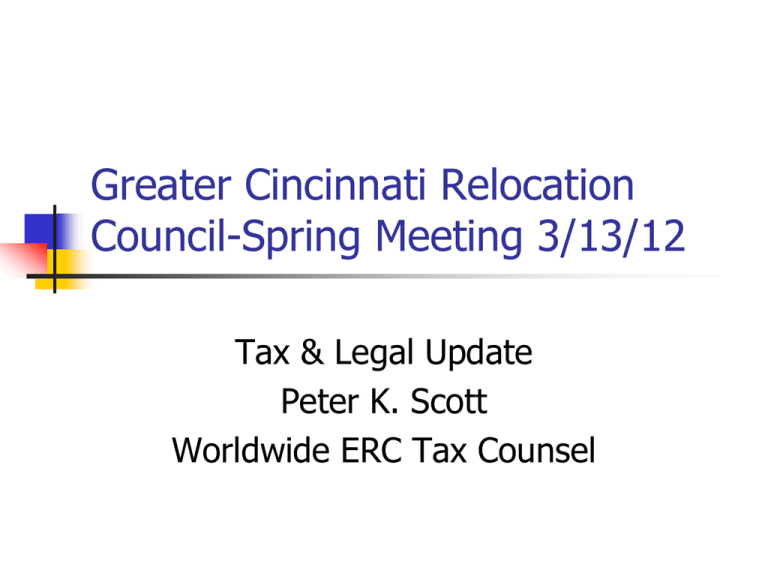Pete Scott`s Presentation from the March 13 Meeting
advertisement

Greater Cincinnati Relocation Council-Spring Meeting 3/13/12 Tax & Legal Update Peter K. Scott Worldwide ERC Tax Counsel Topics Payroll Tax Legislation What didn’t happen What might happen BVO’s-Audit and other issues Relocation Short Sales New Foreign Asset Reporting Requirements Privacy Issues Severed Mineral Rights-why you should care Payroll Tax Legislation Payroll Tax Cut Extension Extends reduction in employee contribution to Social Security from 6.2% to 4.2% Extends cut from February 29 to December 31, 2012 Cost of extension is $93.2 billion over ten years Funds are shifted from general treasury to Social Security Funds from general treasury are not offset and thus increase the federal deficit Payroll Tax Legislation Extension eliminates complications for payroll administrators created by twomonth cut Those earning more than the $110,000 maximum subject to FICA would have had to pay back to the system with income tax return Systems would have had to be reprogrammed in mid-year Payroll Tax Legislation Unemployment Benefits Extension Extends long-term unemployment benefits until December 31, 2012 Benefits gradually reduced starting in June from average of 93 weeks to 63 weeks depending on rate of unemployment in that state Cost of extension is $30 billion over ten years Extension offset by proceeds of wireless spectrum auction and increase in contribution for new civilian federal employees to federal pension program Payroll Tax Legislation What didn’t happen: Expired provisions were not addressed Deduction for state sales taxes Deduction for mortgage insurance Alternative Minimum Tax Exemption amounts are not indexed for inflation, Congress has been temporarily raising them every year Needs to do so again for 2012, but hasn’t done so If it doesn’t, more than 30 million middle-class taxpayers will owe additional taxes for 2012 Gross-up issue for Mobility industry Tax Reform “A tax loophole is something that benefits the other guy. If it benefits you, it is tax reform.” Russell B. Long “I was working on a flat tax proposal, and I accidentally proved there’s no God.” Homer Simpson “This idea that you start with a clean slate and end up with a beautiful, logical tax system just isn’t democracy.” John L. Knapp Tax Reform Both parties continue to talk about Probably will be more hearings Absolutely nothing will happen during election year Possible could happen next year Most popular notion is to reduce/eliminate tax breaks that cost money, reduce/flatten rates somewhat Mortgage interest deduction State/local income tax deduction Foreign income exclusion Home sale capital gain exclusion Moving expense deduction BVO’s “The Opera reminds me of my tax audit. It was in a language I didn’t understand, and it ended in tragedy.” Jeff McNelly’s “Shoe” BVO’s IRS agents still sometimes contend BVO with no appraisal, guaranteed buyout, not within Rev. Rul. 2005-74 Good case they are wrong, but ERC continues to recommend addition of delayed AV process Position of IRS lawyers who wrote Rev. Rul. 2005-74 unclear Have expressed some skepticism that BVO works, but no definite position No indication yet that issue has resurfaced as part of the IRS’s ongoing special employment tax audits, but caution advised BVO’s Delayed AV Process-Example Employee markets with BVO for 90 days If no offer, company does appraisals or BMA’s, determines an appraised value Offers employee appraised value, or some realistic percentage of it (e.g., 90%), but Employee must continue to market for 60 days before accepting Must market at no more than realistic percentage of appraised value (e.g., 102%) IRS invariably accepts this process as a qualifying AV BVO’s Generally, audits less frequent than in past, but still a number every year Audits focus not only on basic BVO, but procedures used (also in AV) Poor audit results are almost always the result of questionable risk reduction procedures used by company BVO’s-questionable procedure In both AV and BVO, companies often have waited to enter contract with transferee until inspections are complete, all contingencies are removed from outside contract Transferee is usually involved in negotiating inspection results Company does not sign contract with transferee until very shortly before outside closing, resulting in a “holding period” of no more than 1-3 days BVO’s-Questionable Procedure IRS consistently maintains that this practice falls within “situation 3” of Rev. Rul. 2005-74 and that the program fails. Company has simply not assumed any significant ownership risk for any significant period of time Companies should NOT engage in practices that artificially create short holding periods. They should also NOT wait for inspections to be completed before contracting with employee. Better practice is to do own inspections up front, do not rely on buyer inspections to set price for purchase from employee BVO’s-Audit Results “We try to cooperate fully with the IRS, because, as citizens, we feel a strong patriotic duty not to go to jail.” Dave Barry Tax Lawyer’s Golden Rule: If somebody has to go to jail, make sure it’s the client BVO’s-Audit Results In audits, IRS invariably asks for complete list of purchase and sale dates IRS invariably concludes that all purchases/sales within a few days of each other fail Some success for taxpayer when it can be shown that nothing other than transferee vacate date causes some to be close together However, if procedures force short periods, IRS always sticks to disallowance Settlements usually involve company conceding all transactions where purchase/sale within some agreed number of days of one another Relocation Short Sales “If you owe the bank $100 that’s your problem. If you owe the bank $100 million, that’s the bank’s problem.” J. Paul Getty A short sale addresses the latter problem Relocation Short Sales Many potential transferees owe more than their equity in the home If they are incapable of paying off this “negative equity,” they may be able to negotiate a “short sale” with the lender(s), under which the house is sold for its fair market value and the lender(s) agree to forgive the deficit amount It is possible to take these homes into a relocation home sale program (some companies will do so, others won’t), but some issues must be addressed Relocation Short SalesDisclosure Any transferee who must make a short sale may still have relocation home sale benefits, such as Loss on Sale, Bonus, or payment of sale expenses Lender may claim fraud if employee has relocation benefits going into the employee’s pocket that are not disclosed If lender claims it was misled, it may seek to undo the short sale approval, leaving the employer with liability for the full loan amount Employer should inform employee in writing that relocation benefits must be disclosed to the lender Employer should also advise Realtor® who is dealing with the lender to insure that such benefits are disclosed Relocation Short Sales In a relocation short sale, still must have two separate, independent sales for tax purposes In a homesale program, companies must be extremely careful that the amount of negotiation and finalization of the outside sale between transferee and buyer does not violate the “two transaction” requirement for favorable tax treatment Lender ordinarily willing to base acceptance of short sale on offer from employer, provided it can be satisfied amount is FMV In an AV or GBO, there will be appraisals In a BVO, need contract with outside buyer to establish value. Relocation Short Sales But company must protect itself in event lender approval to reduce debt is not obtained If company buys house without reduced debt, will become liable for entire debt Excess debt over FMV of house will be wage income to employee, subject to withholding, FICA Same result as if employer had paid negative equity on employee’s behalf Relocation Short Sales How to protect company: DO NOT include clause in sale contract with outside buyer making that contract contingent on employee obtaining debt reduction DO include clause in purchase contract with employee making that transaction dependent upon employee obtaining debt reduction This is no different than standard clause in such contracts requiring that employee pay negative equity DO include clause in Addendum with buyer making entire contract contingent upon company ability to obtain ownership of the home This is a standard clause in all relocation sales Relocation Short Sales If a short sale is done in a home sale program, must carefully examine lender approval letter Some lenders are inserting clauses that allow them to withdraw the approval under certain circumstances If approval withdrawn after employee cashed out, employer is stuck with the negative equity Relocation Short Sales Other factors: Lenders should actually prefer relocation short sales over not only foreclosures, but over other short sales Unlike other short sales, company is paying sale costs, they don’t come out of proceeds and reduce lender share Sometimes lenders don’t understand this, have to be reminded Some lenders continue to have issues with corporate purchasers, or with fact there will be a “flip” within a short period Lenders sometimes include various representations in affidavits that purchaser must sign that are problematic because company doesn’t know all the facts relating to outside buyer Foreign Asset Reporting “American tax laws are constantly changing as our elected representatives seek new ways to ensure that whatever tax advice we receive is incorrect.” Dave Barry Foreign Asset Reporting Foreign Bank Account Reports are required to be made to Treasury each June 30 if a U.S. person has foreign accounts aggregating $10,000 or more at any time during the preceding year (Form TD F 90-22.1, the “FBAR”) New regulations make clear that the reporting obligation extends to individuals who have signature authority (but no personal interest) in foreign accounts, such as company officers and employees Foreign Asset Reporting U.S. expats with bank account signature authority in foreign country must be made aware of this new requirement Notice gives such individuals until June 30, 2012, to file reports for 2010 and prior years Includes accounts in foreign branches of U.S. banks Companies must make sure their employees understand these rules and comply; penalties for noncompliance are substantial Basic penalty up to $10,000 (not willful, but no reasonable cause) Willful failure: Greater of $100,000 or 50% of amount in account Foreign Asset Reporting Taxpayers must also check a box in Schedule B of the Form 1040 if they have foreign accounts, including signature authority Must check box even if no FBAR required This is a change from prior years Must answer “yes” if required to file FBAR Employers who have employees with reportable signature authority should inform employees before 2011 tax return is due so employees can accurately fill out schedule B Foreign Asset Reporting Also, for 2011 there is a new reporting requirement with the tax return itself if foreign accounts aggregate more than $50,000 at any time during the year Form 8938 These forms must be filed with 2011 tax return Foreign Asset Reporting Part of ongoing government crackdown on taxpayers who hide assets offshore “Taxpayers who neglect paying tax on offshore income out of ignorance must be educated. Taxpayers who do it on purpose must be scared.” Martin A. Sullivan Foreign Asset Reporting Regulations in December, 2011, provide helpful rules Reporting only if assets aggregate $75,000 at any time, or $50,000 at end of year For expats who qualify for earned income exclusion (section 911), reporting only if assets exceed $300,000 at any time, or $200,000 at end of year If married filing joint, $600,000 and $400,000 Regulations make clear this report is not required of those with only signature authority But penalties quite severe for those who are required to report but fail to do so Privacy Law of Probability: The probability of being watched is directly proportional to the stupidity of your act Privacy Handling Personally Identifiable Information (PII) is an ongoing issue for anyone receiving or supplying services in the relocation industry Myriad of privacy laws (both domestic and international), increased incidence of identity theft, and heightened concern by individuals over privacy Privacy Definition of PII Information which, alone or in combination with other data, can be used to distinguish or trace an individual’s identity, such as: Full name (usually in combination with other elements) SS# Biometric records IP address Drivers license Credit card numbers Address Date of birth Bank account information Privacy AICPA and Canadian Institute of Chartered Accountants (CICA) have published “Generally Accepted Privacy Principles” (GAPP) Standards to be used in auditing for privacy Ten principles Privacy GAPP principles: the entity Defines, documents, communicates, and assigns accountability for privacy Provides notice about privacy, identifies purposes and uses Provides choices to individual Restricts collection only to purposes identified in notice Limits use to identified purposes Grants individuals access to PII Discloses to third party only for identified purposes and uses Protects PII against unauthorized access Insures accuracy of PII Monitors its own procedures for compliance Privacy New Standards for Auditing - AICPA SSAE16 replaces SAS 70 Privacy is one of the five principles that are being audited Showing up as an issue in RFP questions Example - How do you protect our employee’s personal information Example – How do you handle the purging of our employee’s personal information Privacy How are your suppliers handling PII you provide to them? Contract terms Supply chain management Tracking and monitoring PII in the hands of your suppliers Applies to corporate users of relocation services Applies to RMC’s management of their supply chains Not just a matter of satisfying business partners. Many industry companies collect, or have access to, private, nonpublic information of transferring employees; this information must be kept securely. The law and regulations demand tight security of private financial data, and thefts or leaks of this information inevitably lead to lawsuits. Severed Mineral Rights Old country song about separation: “I’m so miserable without you, its just like you were still here” Severed Mineral Rights Many states permit severance of the surface estate (the house and land) from the underlying mineral rights (like gas & oil), and each can be sold separately As search for more energy escalates, and more methods are devised for extraction (e.g. “fracking” for natural gas in Eastern and Mid-Atlantic states like PA), exists almost nationwide Is becoming a more common fact of life in relocation Creates two serious problems for relocation properties Severed Mineral Rights Owner/lessee of mineral rights has right to access the surface to do what is necessary to extract mineral Could involve drilling, piping, or other activities that significantly detract from usability of the home May not use surface, but indirectly conduct activities beneath home Possibility that this could occur is a problem in itself, may create buyer stigma Severed Mineral Rights Valuation of properties is difficult Value is diluted by lack of mineral rights Value also may be compromised by perception that use may be disrupted by extraction activities Few appraisers qualified to determine amount of negative value adjustment Severed Mineral Rights Definition of Fair Market Value: “The value arrived at in negotiations between a willing tax lawyer and a willing revenue agent, neither of whom has ever bought or sold anything of consequence in his life.” Severed Mineral Rights What to do? Suggestion: Properties with severed mineral rights are not eligible for home sale program, unless Employee has a home that was purchased with mineral rights already severed Home is in an area where this status is common, and severed properties are readily marketable Home can be reasonably valued and appraised by qualified professionals Employee should not be allowed to use the relocation to sell the home to employer, and the mineral rights to someone else The End Old saying: “Knowledge is knowing the tomato is a fruit. Wisdom is not putting it in a fruit salad.” However, Murphy’s First Minor Law: Anything you try to make absolutely clear will confuse everybody Therefore: QUESTIONS!!! (And Answers) Rules: Has to be one I can answer (but not necessarily on the subjects we covered) Questioner cannot be on permanent “banned” list (you know who you are) No “stump the tax nerd” No questions such as “how much do you weigh” Contact information: pkslawoffice@gmail.com 910-579-5332













